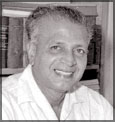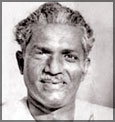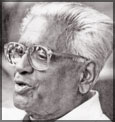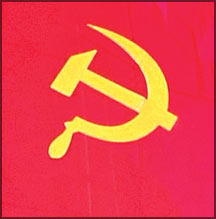|
LSSP - 75 years of struggle and achievement:
Sri Lanka’s oldest political party
The Lanka Sama Samaja Party (LSSP) is the oldest political party in
Sri Lanka and the first to be able to celebrate its 75th Anniversary. It
grew out of the Suriyamal Movement and was established on December 18,
1935, when the inaugural Conference was held.
Dr Colvin R de Silva was elected as the first and only President (as
that post was abolished thereafter). The LSSP began as a Socialist Party
that introduced the Marxist tradition of politics to Sri Lanka, but with
a truly nationalist flavour. Among its founder leaders have been the
most gifted and able political leaders that this country has produced -
Dr N M Perera, Dr Colvin R de Silva, Philip Gunawardena (subsequent
leader of the VLSSP, that joined Mr. Bandaranaike, to form the MEP), Dr
S A Wickremasinghe (subsequent leader of the CPSL) and Leslie
Goonewardene.

Dr N M Perera |

Philip Gunawardena |

Dr Colvin R de Silva |
The LSSP had two main objectives - gaining complete political
independence from the British, and putting an end to exploitation by
creating a socialist ‘Sama Samajaya’. It was the former that was the
immediate short-term objective, and the latter was a long-term objective
to be achieved progressively through the struggle for social justice and
economic development.
In this brief summary of the LSSP’s struggles and achievements only a
few highlights will be mentioned.
It is our hope that a detailed history that does justice to its epic
struggles and great achievements will eventually materialize and that
its contribution to our country’s history will be properly recognized
and appreciated.
The LSSP led the struggle for complete political independence
The people were left out of the struggle for independence. The
English-speaking elite, led by the feudal and emerging capitalist
forces, sought to do a deal with the British rulers, and unfortunately
without a common Lankan approach, so that narrow sectarian nationalisms
surfaced. For the first time the LSSP had open-air meetings in Sinhala
and Tamil and placed the issues before the people, coining suitable
terms to enable them to understand.

It mobilized all cultural groups. The Tamil Youth League from Jaffna
led by Handy Perimbanayagam joined them. It was the LSSP leaders like
NM, Colvin, Philip, Edmund and Bernard who were imprisoned by the
British both here and also in India, where they joined the Indian mass
independence struggle led by Gandhi and Nehru.
The Independence granted in 1948 was a partial independence. Lanka
was only given Dominion status - the Head of State remained the British
Queen, acting through the Governor General (who was appointed by the
Queen), British troops continued to be stationed here and the Privy
Council in Britain was the final arbiter on all legal decisions. Even
the Acts passed by the House of Representatives had to be approved by
the Senate, half of whose members were appointed by the Governor
General.
Complete independence was only gained during the SLFP/LSSP/CP
Coalition Government, on May 22, 1972, through the Republican
Constitution, the architect of which was Dr Colvin R de Silva. All
powers of the British Crown to interfere in our affairs were totally
removed by this Republican Constitution.
The 1972 Republican Constitution - a historic achievement
It not only completely severed the umbilical cord that politically
tied us to Britain, ever since the British gained full control of the
island in 1815. It also signalled the end of colonial rule over our
territory which began in 1505, with the Portuguese. It signifies the
emergence of the Republic of Sri Lanka in the international field as a
completely independent, national and State entity. In fact the
historical hold that the monarchy had over our people from ancient times
was removed forever. By stating in Section 3 of the 1972 Constitution
that “In the Republic of Sri Lanka sovereignty is in the people and is
inalienable” the people of Sri Lanka were made sovereign in and over Sri
Lanka for the first time in our history. The people could exercise their
sovereignty through the National State Assembly. For the first time an
extensive ‘Fundamental Rights and Freedoms’ Chapter, with adequate
safeguards for the minorities, which was lacking in the Soulbury
Constitution, was introduced into this 1972 Constitution. Even what was
stated in Section 29 (2a) of the Soulbury Constitution that “no
community shall have an advantage” is included there. In any case
Section 29 was so weak that it failed to prevent the enactment of the
Citizenship Bill that disenfranchised the Indian Tamils, as well as the
‘Sinhala Only’ Act.
Protection of the rights of the oppressed and uniting the nation
From its inception the LSSP has fought for the rights of all
oppressed groups in the country. In the struggle for independence too
the Party sought to unite all social groups and strata as one Sri Lankan
nation.
While respecting and promoting the diverse cultures, the LSSP has
always tried to unite them all as one Sri Lankan nation, with an over
riding Sri Lankan culture.
It was the two leaders of the LSSP in the State Council, NM and
Philip, who initiated the process of making Sinhala and Tamil official
languages by proposing that these two should be used in the Police
stations and Courts as languages of record.
When labour from India was being brought in to the country in large
amounts to operate the plantations, while thousands were unemployed and
deprived of their land in the villages, NM warned of the dangers and
requested the British Government to stop it.
At the same time the LSSP demanded that all those who had come from
India should be given all citizenship rights if they so desired it.
Oppression on caste and gender grounds was widespread both in the
South and the North. The LSSP consistently opposed this and fought on
the side of the oppressed.
There was neglect and religious oppression against Buddhism, Hinduism
and Islam during British rule, to which again the LSSP paid due
attention.
The LSSP opposed the Indian Citizenship Bill brought by the UNP which
deprived the Tamils on the plantations of their citizenship rights.
The LSSP anticipated the unfortunate consequences of the Official
Language Act of 1956 (the Sinhala Only Act).
To be continued
|



